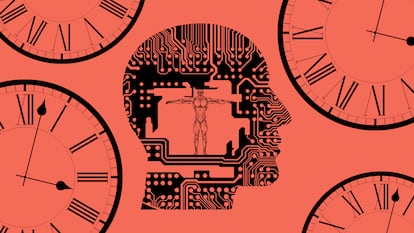In pursuit of greater productivity, over the years we have designed ever faster technologies to save time, supposedly. Retina Country / Retina Illustration
In search of greater productivity and time savings, we have designed increasingly fast and competent technologies. This is what happened with the arrival of various means of transport, the printing press and the internet. Faced with the promise of streamlining processes to work better and fewer hours, there are no detractors. But today, many people find themselves faced with the paradox that, as technology improves, the scarcer the free time. In other words, the more Zoom, the less leisure. Have we been deceived? For many philosophers, psychologists and researchers, the belief that machines arose to free us from the burden of time is a false promise that should be banished.
“For a long time there has been a belief that technical progress leads to increased productivity, capable of making us enjoy a more contemplative and happy life. But, in reality, the opposite has happened ”, says Jorge Franganillo, researcher and professor of Information and Documentation at the University of Barcelona by mail. The researcher has published multiple studies, including
Personal Information Management,
in which he analyzes the paradox between technology and saving or wasting time through various tools, such as email or social networks.
Franganillo is supported by philosophers such as the Slovenian Slavoj Žižek with his essay
Pandemic: welcome to the viral desert
or the South Korean Byung-Chul Han in his book
The Society of Fatigue,
who also warn of a new exploitation without authority, in which users of technology are both slaves and masters. “We exploit ourselves voluntarily and passionately believing that we are realizing ourselves. What we are exhausted is not external coercion, but the internal imperative of having to perform more and more ”, Han explains in this
Ideas
article
.
From Australia, Dr. Aoife McLouglin and her team of researchers from James Cook University have also highlighted the less friendly side of the technology and time relationship.
According to the study conducted by McLouglin, the use of any type of technology alters people's perception of time and makes them believe that they have more free minutes because they use digital tools to perform at work, even when this is not entirely true.
“While it can help us work faster, technology also makes us feel more pressed for time.
When the speed of the rhythm of life increases, the subjective feeling of having free or available time decreases, causing a feeling of stress within the individual ”, the doctor says.
Busier than ever
"In reality, we are dominated by the accelerated seed of technology, which has made us busier than ever, forced to do everything faster," explains Franganillo. And the abrupt arrival of teleworking due to the coronavirus pandemic has served to prove it. For example, 66% of Spanish companies increased their productivity during the third quarter of 2020, an average of 22%, above the 18% international and only behind Germany. In addition, a study by the McKinsey consulting firm published at the end of last year revealed that in Spain, the United Kingdom, France, Germany, India, Japan, Mexico, China and the United States, more than 20% of the employed - who work around two.000 activities in 800 different jobs — you could telecommute three to five days a week as efficiently as if you were working from the office. But that increased productivity has also had an impact on physical and mental health.
"Although these tools were born as a source of autonomy and flexibility, in reality they intensify the expectations of constant communication and involvement at work, and consequently increase stress," explains Franganillo. In the same vein, the psychologist and techno-stress expert, Celestino González-Fernández emerged, in a conversation via WhatsApp, that between hyperconnectivity entails
technoaddiction
,
techno-anxiety
and
techno-fatigue
and that so much exposure is unsustainable for mental health.
“This hyperconnectivity will lead in the coming years to reduce the consumption of technology in many cases and sectors of the population.
Not to set aside, demonize or eliminate digital tools, but to make them less invasive in our lives.
We will seek to a greater extent the digital disconnection ”, predicts the psychologist.
At full speed
Experts suggest that one of the reasons we have fallen into the paradox between technology and time is the cult of speed. Demands are growing for the faster internet, faster smartphone operating system, and even in the media, readers are demanding more news, reports and research in less time. More, more and more. “We have the belief that the faster we do everything, the more time we win. And we are so immersed in this culture of hyperproductivity that it is difficult to stop and assess whether speed should be the true measure of innovation ”, reflects Franganillo.
The feeling that we have less time for leisure, relationships and sleep could be due to the amount of social networks, connection points and new ways of working that have been the effect of technology.
"What explains the subjective feeling of being so busy is not the amount of time we have, but the quality and character of that time," emphasizes the researcher.
The key is in how we organize the time available and in how we temporarily distribute the daily activities.
More information
The more your country is digitized, the more time you spend sitting
And like everything else, the problem is not in the tools or in the technology itself, but in the use that we are willing to give them within our daily activities, in our social circles and family relationships.
"If we feel timeless and busy, it is not so much because of the gadgets themselves, but because of the priorities we establish in our lives," concludes Franganillo.
You can follow EL PAÍS TECNOLOGÍA on
and
.




/cloudfront-eu-central-1.images.arcpublishing.com/prisa/FNGPJSHXQZC2BCMQTEUWCUOKDY.jpg)









